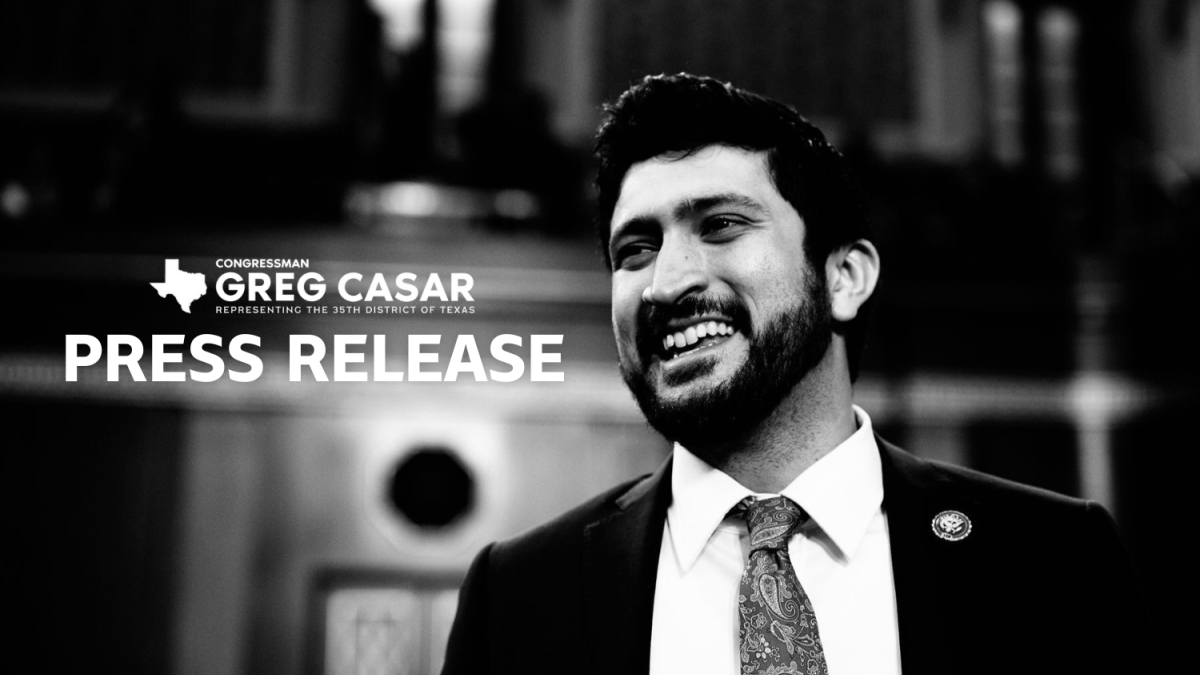NEWS: Congressman Greg Casar Introduces New ‘Stop AI Price Gouging and Wage Fixing Act’

WASHINGTON – Today, Congressman Greg Casar (D-Texas), joined by Congresswoman Rashida Tlaib (D-Michigan), introduced the Stop AI Price Gouging and Wage Fixing Act, the first federal proposal to ban companies from using Artificial Intelligence (AI) to set prices or wages based on Americans’ personal data.
The bill would prohibit practices like an airline raising prices for an individual after seeing her search for a family obituary or a ride share app paying a driver less after seeing that she visited a pawn shop.
Concern over corporations using AI to set prices and wages is growing. Delta Airlines just announced plans to set 20% of prices using AI by the end of the year, up from 3% currently. Earlier this year, the Federal Trade Commission released a study showing that “retailers frequently use people’s personal information to set targeted, tailored prices for goods and services—from a person's location and demographics, down to their mouse movements on a webpage.”
“Giant corporations should not be allowed to jack up your prices or lower your wages using data they got spying on you,” said Rep. Casar. “Whether you know it or not, you may already be getting ripped off by corporations using your personal data to charge you more. This problem is only going to get worse, and Congress should act before this becomes a full blown crisis.”
“It is shameful that companies would use our neighbors’ sensitive personal information against them to raise prices,” said Rep. Tlaib. “The idea that employers would leverage surveillance data to exploit a worker in a desperate position and offer them a lower wage is appalling. I am proud to stand with Rep. Casar to ensure that consumers receive fair and transparent prices and that employees are fully compensated for their work.”
The bill is endorsed by: American Economic Liberties Project, Consumer Federation of America, Groundwork Collaborative, Local Progress, National Employment Law Project, Open Markets Institute, P Street, Public Citizen, and Towards Justice.
“This bill draws a clear line in the sand: companies can offer discounts and fair wages—but not by spying on people,” said Public Citizen. “Surveillance-based price gouging and wage setting are exploitative practices that deepen inequality and strip consumers and workers of dignity. Public Citizen strongly supports this bill because it gives the FTC, EEOC, state attorneys general, and individuals the tools they need to stop these abuses and put power back where it belongs: with the people”
“There is no such thing as a good deal when every consumer is charged a different price,” said Lee Hepner, Senior Legal Counsel at the American Economic Liberties Project. “Armed with extraordinary access to personal information, corporations are using opaque algorithms to set prices based on perceived individual need, which often means higher costs for essential goods. Grocery prices have risen 26% since the pandemic-era explosion of online shopping, dovetailing with new technology designed to squeeze every last penny from consumers. Federal lawmakers should join this effort to restore fair, transparent, and predictable pricing.
“We are in the midst of an affordability crisis in this country, and corporation’s expanding use of surveillance pricing and wage setting is making it even harder for families to get by,” said Joe Van Wye, Senior Legislative Strategist at P Street. “These mega-corporations are exploiting algorithmic pricing to squeeze even more money from working people on everything from gas to groceries to prescription drugs. We commend Rep. Casar for his leadership on this issue, and are excited to work with him to create an economy that truly works for working people”
The Stop AI Price Gouging and Wage Fixing Act of 2025 would:
- Generally prohibit the use of Surveillance-Based Price Setting, which is the use of automated systems to set different prices for different consumers based on personalized data, which can include information like a person’s browsing history, location history, address, race, gender, or genetics.
- Generally prohibit the use of Surveillance-Based Wage Setting, which is the use of automated systems to set wages based not on performance but on personalized data, like browsing history.
- Allows the ban to be enforced by the Federal Trade Commission, state attorneys general, and a private right of action, and, in the case of wages, the Equal Employment Opportunity Commission.
The bill does not prohibit discounts for members of loyalty programs or for groups like veterans or seniors.
Text of the bill can be found here and the one-pager can be found here.
###
Congressman Greg Casar represents Texas’s 35th Congressional District in the U.S. House of Representatives, which runs down I-35 from East Austin to Hays County to the West Side of San Antonio. A labor organizer and son of Mexican immigrants, Casar serves as the Chair of the Congressional Progressive Caucus for the 119th Congress. He also serves on the Committee on Education and Labor and the Committee on Oversight and Accountability.